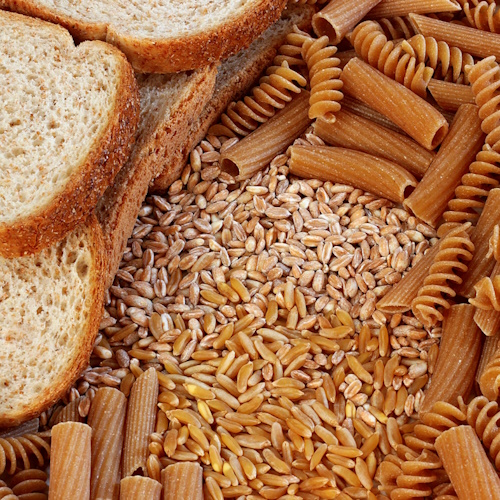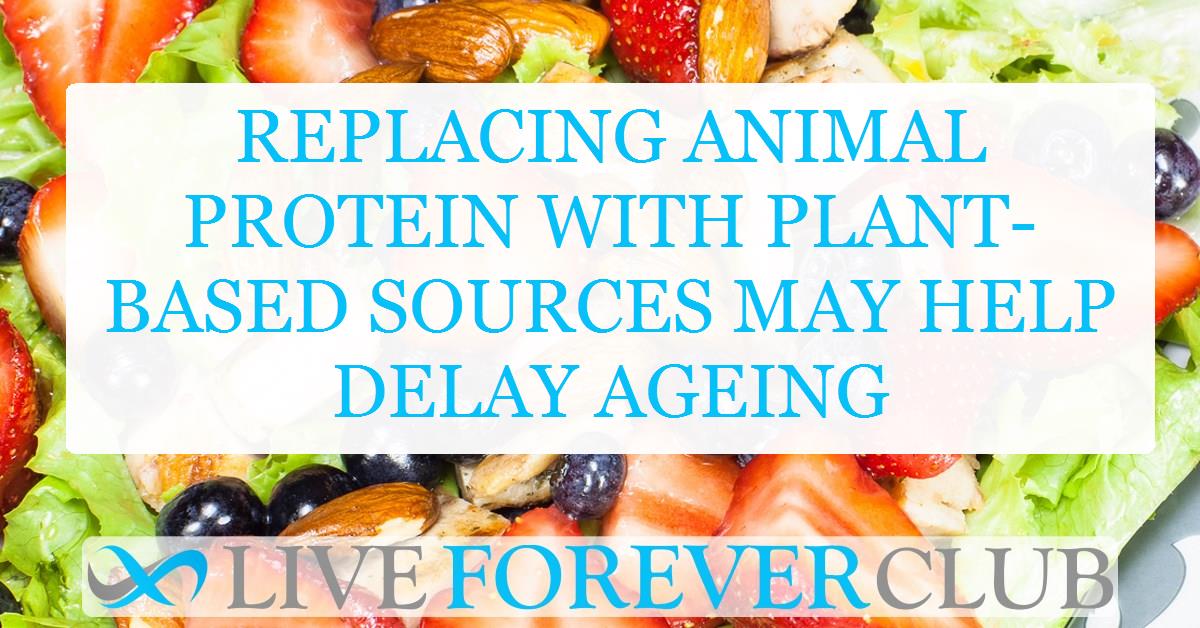Ageing is inevitable, but the way we age can differ significantly from person to person. While chronological age is simply the number of years we've been alive, biological age provides a more nuanced understanding of our body’s health and its cellular wear and tear. It reflects how well or poorly our body's systems are functioning in relation to our actual age. Many factors influence biological ageing, but recent research suggests that our diet, particularly our intake of plant and animal proteins, could play a key role in this process.
A groundbreaking study published in the European Journal of Nutrition explored how different types of dietary proteins—specifically plant and animal proteins—affect biological ageing.
The study, titled Association Between Plant and Animal Protein and Biological Aging: Findings from the UK Biobank, used data from over 79,000 participants. The findings were compelling: higher plant protein intake was linked to slower biological ageing, while animal protein showed no clear impact. This suggests that incorporating more plant protein into our diet could be an effective way to promote healthier ageing.
Understanding Biological Ageing
Before diving into the details of the study, it's important to understand what biological ageing is and how it differs from chronological ageing. Chronological age is simply the number of years a person has lived, but biological age refers to the condition of a person’s body and how well or poorly it is ageing. Biological age can be measured using various biomarkers, such as telomere length, which reflects cellular ageing, or markers of chronic stress and inflammation in the body.
The UK Biobank study used four major biological aging indices to measure how well the participants’ bodies were aging:
- Klemera-Doubal Method Biological Age (HKDM-BA): This method uses clinical biomarkers to assess the biological integrity of multiple organ systems.
- PhenoAge (HPA): This is a biological ageing measure based on mortality risks associated with certain clinical parameters.
- Allostatic Load (HAL): This index measures the cumulative burden of chronic stress on the body, which can lead to accelerated ageing.
- Telomere Length (LTL): Telomeres are protective caps on the ends of chromosomes. As we age, telomeres shorten, so longer telomere length indicates healthier biological ageing.
The study’s objective was to evaluate how plant and animal proteins influence these four biological ageing indices, providing a comprehensive view of how diet affects the ageing process.
Diet’s Role in Aging
The data for this research came from the UK Biobank, a large-scale population-based cohort study that included more than 500,000 participants aged 40–69 years. This specific analysis focused on 79,294 participants who had completed at least two dietary assessments. These participants’ protein intake from both plant and animal sources was carefully analysed, and their biological ageing was assessed using the four indices mentioned above.
The researchers used logistic regression to evaluate the associations between dietary protein intake and biological ageing. They also constructed substitution models to determine the effects of replacing animal protein with plant protein on these ageing markers. The study's key finding was that higher plant protein intake was consistently linked to better biological ageing outcomes, while animal protein intake showed no clear impact.
Plant Protein’s Impact on Biological Ageing
The most striking finding of the study was the inverse relationship between plant protein intake and biological ageing. Participants who consumed higher amounts of plant protein had significantly lower odds of having accelerated biological ageing based on all four indices. Specifically, the study found that higher plant protein intake was associated with:
- Lower HKDM-BA: The odds ratio for the highest quartile of plant protein intake compared to the lowest was 0.83, meaning participants who consumed the most plant protein had a 17% lower chance of having accelerated biological ageing.
- Lower HPA: The odds ratio was 0.86, indicating that high plant protein intake reduced the likelihood of accelerated ageing as measured by PhenoAge.
- Lower HAL: The odds ratio was 0.90, suggesting that plant protein helps reduce the physiological burden of chronic stress.
- Longer Telomeres: Participants who consumed more plant protein had longer telomeres, with an odds ratio of 1.06, meaning they had a 6% greater likelihood of having healthier telomere length.
These findings suggest that plant protein not only helps preserve the structural integrity of cells but also plays a critical role in reducing stress on the body and maintaining cellular health over time.
Animal Protein Showed No Clear Association
Interestingly, the study found that animal protein intake had no consistent association with biological ageing. In some cases, the data even hinted at a slight increase in ageing markers for those who consumed higher levels of animal protein, but the results were not statistically significant across all indices.
This result aligns with previous research suggesting that different types of proteins have varying effects on health. While animal proteins are rich in essential amino acids, they may also come with added risks, such as higher levels of saturated fats, cholesterol, and compounds like nitrites and nitrates (especially in processed meats), which have been linked to chronic diseases.
Substituting Animal Protein with Plants
One of the most powerful aspects of the study was its substitution analysis. The researchers examined what would happen if participants replaced a portion of their animal protein intake with plant protein. The results were dramatic. Substituting just 5% of energy intake from animal protein with plant protein was associated with:
- 19–28% lower odds of accelerated biological aging based on HKDM-BA, HPA, and HAL.
- 12% higher odds of having longer telomeres, indicating better cellular health.
This substitution model suggests that even small dietary changes—such as replacing a portion of meat or poultry with plant-based protein sources—can have a substantial impact on aging.
Benefits of Plant Protein Sources
Not all plant proteins are created equal, and the study also explored the effects of specific plant-based foods on biological ageing. Two categories stood out: whole grains and nuts. Both were strongly linked to better ageing outcomes.
- Whole Grains: Participants who consumed the most whole grains had a 10% lower odds of accelerated biological ageing and 5% higher odds of longer telomeres. Whole grains are rich in fiber, vitamins, and minerals, which contribute to overall health and help reduce inflammation, a key factor in ageing.
- Nuts: Those who consumed more nuts had similar benefits. Nuts are high in healthy fats, fiber, and antioxidants, all of which support heart health and reduce oxidative stress, another contributor to ageing.
These findings reinforce the idea that not only the amount but also the type of plant protein consumed matters when it comes to aging well.
Role of Legumes in Aging
While many plant-based foods were associated with improved ageing, legumes showed a more complicated relationship. Legumes, such as beans and lentils, are typically celebrated for their high nutrient content, including protein, fiber, and antioxidants. However, this study found that legumes were not consistently linked to better ageing outcomes.
One possible explanation is that legumes are also high in purines, compounds that can raise uric acid levels. Elevated uric acid is a risk factor for hyperuricemia, which has been associated with accelerated ageing and chronic conditions such as gout. Thus, while legumes are healthy in many ways, their effect on biological ageing may depend on individual metabolic factors.
Interestingly, the study found that substituting legumes for yogurt had a negative impact on ageing markers, suggesting that certain dairy products might offer unique benefits when it comes to maintaining cellular health.
Yogurt and Other Animal Proteins
While animal proteins generally showed no consistent effect on biological ageing, yogurt was a notable exception. The study found that yogurt intake was inversely associated with HKDM-BA, HPA, and HAL, indicating that it may help slow down ageing. One reason for this could be the presence of beneficial bacteria in yogurt, which improve gut health and may positively influence the ageing process.
Yogurt is also rich in high-quality protein and essential nutrients such as calcium, which are important for bone health. These factors might explain why yogurt was linked to better ageing outcomes, while other animal-based foods, such as red and processed meats, were not.
How Plant Protein Impacts Ageing:
One of the most intriguing aspects of the study was its exploration of how plant protein affects ageing on a biochemical level. The researchers identified three key liver enzymes—gamma-glutamyltransferase (GGT), alanine aminotransferase (ALT), and aspartate aminotransferase (AST)—that mediated the relationship between plant protein and biological ageing.
These enzymes are commonly used to assess liver function, and their levels tend to increase as we age. The study found that higher plant protein intake was associated with lower levels of these enzymes, suggesting that plant protein helps support liver health and, by extension, slows down the ageing process.
For example, GGT mediated 19.1% of the association between plant protein and HKDM-BA, while ALT and AST accounted for smaller but still significant portions of the effect. This suggests that plant protein’s anti-ageing effects are partially due to its ability to improve liver function, which plays a crucial role in detoxifying the body and regulating metabolism.
What Does This Mean for Your Diet?
So, what do these findings mean for the average person looking to age more gracefully? The message is clear: increasing your intake of plant protein can have profound benefits for your biological age. Here are some practical steps to incorporate more plant-based protein into your diet:
- Swap Meat for Plant Protein: One of the simplest ways to start is by replacing red or processed meats with plant-based alternatives like tofu, tempeh, or legumes. Even substituting a small portion of your daily protein intake from animal to plant sources can make a significant difference.
- Eat More Whole Grains: Whole grains like quinoa, brown rice, and oats are excellent sources of plant protein and fiber. Incorporating more whole grains into your meals can help reduce inflammation and support cellular health.
- Snack on Nuts: Nuts are a powerhouse of nutrients, providing healthy fats, fiber, and antioxidants. Try snacking on almonds, walnuts, or pistachios, or add them to salads, smoothies, or oatmeal.
- Don’t Forget About Yogurt: While plant-based proteins should make up the bulk of your diet, yogurt can still play a role in healthy ageing. Opt for plain, unsweetened varieties to avoid added sugars, and enjoy yogurt as part of a balanced breakfast or snack.
- Be Mindful of Legume Intake: While legumes are healthy, they may not be the best choice for everyone, particularly if you’re prone to high uric acid levels. Moderation is key, and it may be wise to balance legumes with other plant protein sources like whole grains and nuts.
Plant-Protein-Rich Diet for Healthier Ageing
The UK Biobank study provides compelling evidence that plant protein plays a crucial role in slowing biological ageing. While animal protein showed no consistent association with ageing, plant protein was linked to better outcomes across all four biological ageing indices. This suggests that by making simple changes to our diets—such as replacing animal protein with plant-based alternatives—we can not only improve our biological age but also enhance our overall health.
The findings highlight the importance of not just how much protein we consume, but the source of that protein. Whole grains, nuts, and even yogurt emerged as key foods that support healthy ageing, while red and processed meats were linked to worse outcomes.
Incorporating more plant protein into your diet is a simple yet powerful way to protect your body’s cells, reduce chronic stress, and maintain the integrity of your DNA as you age. By making these changes today, you can lay the foundation for a longer, healthier life tomorrow.
The study is published in the European Journal of Nutrition by Harbin Medical University.





